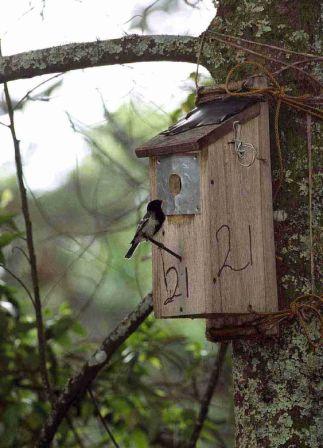|
Dr Phil Shaw* (University of St. Andrews), Prof Derek Pomeroy
(Makerere University), Jane Yatuha (MSc student 2003-4), David Ebbutt
(2004). Field support staff: Narsensius Owoyesigire and Savio Ngabirano
(ITFC)
Funding sources:
WCS, British Ornithologists’ Union, African Bird Club Conservation Fund
Project dates / duration:
The project was established in 1995, and is ongoing.
Background
Much of our understanding of evolution comes from the study of
life-history theory – how animals invest differently in each stage of
their life cycle, so as to maximise their lifetime reproductive output.
Many songbird species in Europe and North America achieve this by
rearing one or a few large broods in the course of their relatively
short lifespan. In contrast, most tropical and south temperate songbirds
appear to be long-lived ‘slow’ breeders, in the sense that they lay
small clutches, have longer breeding cycles, and may suffer higher
levels of nest predation. Theoretically, this type of life history may
render their populations less resilient; less able to increase quickly
if or when the opportunity arises.
Tropical and south temperate species account for
about 80% of the world’s songbirds, yet most of what we know of songbird
life histories has been drawn from long-term studies of north temperate
species. The tits and chickadees (Paridae) exemplify this disparity.
 While species such as the Great Tit Parus major, Blue Tit
Cyanistes caeruleus and Black-capped Chickadee Poecile
atricapillus are among the world’s most intensively studied birds,
much less is known of the 15 tit species endemic to sub-Saharan Africa. While species such as the Great Tit Parus major, Blue Tit
Cyanistes caeruleus and Black-capped Chickadee Poecile
atricapillus are among the world’s most intensively studied birds,
much less is known of the 15 tit species endemic to sub-Saharan Africa.
The aim of this long-term study is to examine the ecology and life
history of the Stripe-breasted Tit Parus fasciiventer, a small
songbird endemic to the Albertine Rift. Specifically, we aim to
determine why the species is so much less abundant than its north
temperate relatives; how it times its breeding activity in relation to
weather patterns and food availability; why it rears so few chicks
(typically just 2-3) at each breeding attempt; why some adults choose to
help their parents, rather than find a mate; and whether the species’
‘slow’ breeding behaviour is indeed balanced by a longer lifespan.
A male
Stripe-breasted Tit bringing food to its nestlings
There are several likely explanations for the Stripe-breasted Tit’s low
breeding output: brood sizes may be more tightly constrained by
competition for food; nest predation rates may be higher (encouraging
females to avoid placing too many eggs in one ‘basket’); or adults may
be ‘unwilling’ to risk their own survival and future breeding
opportunities by attempting to rear large broods of chicks.
 Approach Approach
In
1995 C. Perrins (Oxford University) and D. Pomeroy (Makerere University)
erected 30 nestboxes in the vicinity of the ITFC field station at
Ruhija. A further 30 boxes were later added. Each month, all boxes are
inspected for signs of Stripe-breasted Tit breeding activity. For each
nest, we aim to record laying dates, clutch size, hatching dates and
fledging success; time spent incubating; food delivery rates by each
adult; and nestling growth rates. In addition, colour rings (bands) are
applied to all nestlings and their parents, to help track their
subsequent movements and survival.
Left: a 17-day old
nestling being weighed. This bird and its siblings fledged five days
later.
Click here to read
about the results...
*In 2009, ITFC granted Dr Shaw a Honorary ITFC Research Fellowship, in
recognition for his long term commitment to this study |



